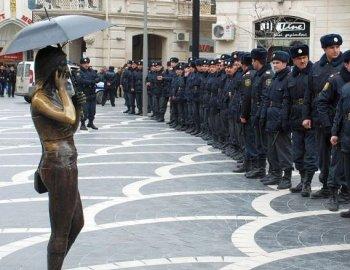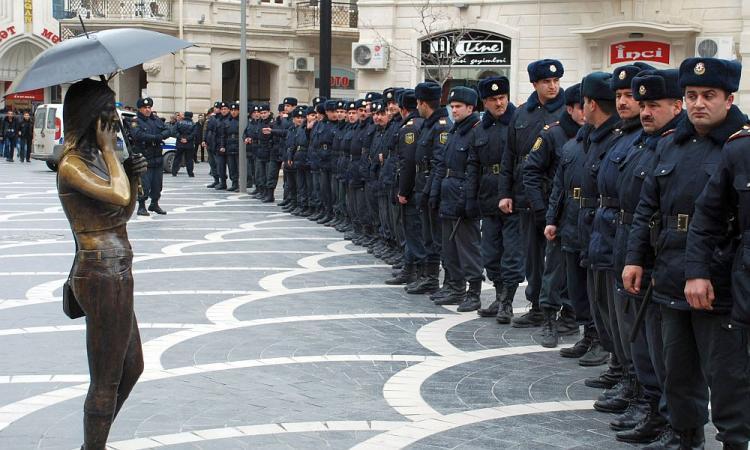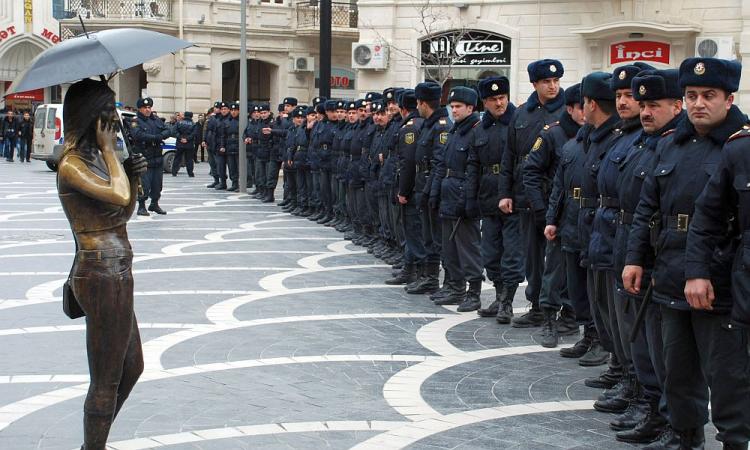They called it the “Great People’s Day,” as they took their message of change and hope to the streets of the capital city, Baku, on Saturday.
Inspired by the ongoing uprisings in the Arab world, young Azerbaijani activists— earlier this month—used Facebook to declare March 11 as the “Great People’s Day” protest against the country’s autocratic leader, Ilham Aliyev, who has ruled the nation of 9 million since 1998.
“After the uprisings and revolts in the Arab world, young people began to understand that it is possible to hold demonstrations and seek reforms,” said Rafick Ismail, 63, head of a local branch of the opposition party, Musavat.
Several hundred opposition supporters called on the Azerbaijani regime to fight corruption and the burgeoning unemployment problem. They also called on the regime to allow opposition forces to appear on TV and to have free elections in the country.
Although it was a peaceful protest, police riot squads were not taking any chances. They forcibly arrested about a dozen political activists and anyone supporting the Musavat Party, which hosted the rally in the center of the capital.
“Azerbaijan resembles analogue life in Arab countries,” says Ismail, referring to his countrymen’s relatively underdeveloped instinct for political reform.
Since Azerbaijan declared independence in 1991—following the Soviet Union’s collapse—media, religious, and political freedoms have been severely stifled.
Arbitrary arrests, imprisonment of political activists, the closing of mosques, violence against journalists, as well as the crackdown on unsanctioned protests, have been the norm for the past several years now.
On March 8, police arrested Sahavat Sultanov, 29, deputy head of the Musavat Party, for actively promoting the March 12 demonstrations through Facebook, according to Human Rights Watch (HRW).
“We fear repeating what happened in the Middle East and African countries in our country. We do not want bloodshed here,” Ismail said.
Novella Zhahuruglo, a human rights activist, said that she did not think that the Baku demonstrations would turn violent, as did the uprisings in the Arab world. Instead, the opposition parties have taken a stance against any violence of any kind.
Zhahuruglo said that opposition leaders were more interested in political reform than overthrowing the current regime and replacing it with another.
She did, however, express a growing fear that radical Islam might spread to Azerbaijan from neighboring Iran.
The protests came on the heals of the Justice Ministry’s suspension of the Azerbaijan Human Rights House, the international advocacy group with 70 nongovernmental organizations (NGO) in 15 countries, which was registered in Baku in 2007.
The suspension was seen as a breach of the amendments to the Law on NGO’s, adopted in June 2009, Azerbaijan officials said.
“This is a blatant example of the Azerbaijani government using seemingly benign bureaucratic rules to silence civil society groups,” said Rachel Denber, director of the Europe and Central Asia Division at HRW, in a statement.
“The government is clearly trying to prevent human rights groups from engaging in public outreach or mobilization.”
Inspired by the ongoing uprisings in the Arab world, young Azerbaijani activists— earlier this month—used Facebook to declare March 11 as the “Great People’s Day” protest against the country’s autocratic leader, Ilham Aliyev, who has ruled the nation of 9 million since 1998.
“After the uprisings and revolts in the Arab world, young people began to understand that it is possible to hold demonstrations and seek reforms,” said Rafick Ismail, 63, head of a local branch of the opposition party, Musavat.
Several hundred opposition supporters called on the Azerbaijani regime to fight corruption and the burgeoning unemployment problem. They also called on the regime to allow opposition forces to appear on TV and to have free elections in the country.
Although it was a peaceful protest, police riot squads were not taking any chances. They forcibly arrested about a dozen political activists and anyone supporting the Musavat Party, which hosted the rally in the center of the capital.
“Azerbaijan resembles analogue life in Arab countries,” says Ismail, referring to his countrymen’s relatively underdeveloped instinct for political reform.
Since Azerbaijan declared independence in 1991—following the Soviet Union’s collapse—media, religious, and political freedoms have been severely stifled.
Arbitrary arrests, imprisonment of political activists, the closing of mosques, violence against journalists, as well as the crackdown on unsanctioned protests, have been the norm for the past several years now.
On March 8, police arrested Sahavat Sultanov, 29, deputy head of the Musavat Party, for actively promoting the March 12 demonstrations through Facebook, according to Human Rights Watch (HRW).
“We fear repeating what happened in the Middle East and African countries in our country. We do not want bloodshed here,” Ismail said.
Novella Zhahuruglo, a human rights activist, said that she did not think that the Baku demonstrations would turn violent, as did the uprisings in the Arab world. Instead, the opposition parties have taken a stance against any violence of any kind.
Zhahuruglo said that opposition leaders were more interested in political reform than overthrowing the current regime and replacing it with another.
She did, however, express a growing fear that radical Islam might spread to Azerbaijan from neighboring Iran.
The protests came on the heals of the Justice Ministry’s suspension of the Azerbaijan Human Rights House, the international advocacy group with 70 nongovernmental organizations (NGO) in 15 countries, which was registered in Baku in 2007.
The suspension was seen as a breach of the amendments to the Law on NGO’s, adopted in June 2009, Azerbaijan officials said.
“This is a blatant example of the Azerbaijani government using seemingly benign bureaucratic rules to silence civil society groups,” said Rachel Denber, director of the Europe and Central Asia Division at HRW, in a statement.
“The government is clearly trying to prevent human rights groups from engaging in public outreach or mobilization.”






